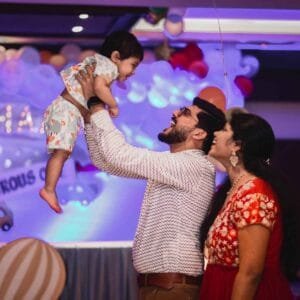Photography Videography
Photography and videography are essential aspects of capturing and preserving memories at any event, whether it’s a wedding, birthday party, corporate event, or special occasion. The right photography and videography services can transform moments into cherished memories, ensuring that every emotion, detail, and special moment is documented beautifully. Here’s an overview of how photography and videography can be integrated into various events:
Photography
Types of Photography Services for Events
Event Photography:
Documentary/Photojournalistic: This style focuses on capturing candid moments and natural emotions throughout the event. The photographer will blend into the background and capture unposed, authentic moments.
Traditional/Posed: This approach involves more structured, posed shots, such as group photos, family portraits, or formal poses for weddings, graduations, and corporate events.
Candid Photography: A photographer will capture guests and participants interacting without them posing, showcasing the fun, laughter, and genuine emotions of the event.
Portrait Photography: Special photoshoots for individuals or small groups, focusing on their facial expressions and personal style. This is common at weddings, graduations, and corporate events.
Fine Art Photography: A photographer may take an artistic approach, using unique lighting, angles, and composition to create visually striking images. These can be edited for a high-end, artistic feel.
Specialized Photography Styles:
Black and White Photography: A timeless and classic approach to capturing photos with a focus on contrast and composition. Often used to highlight emotions or create an elegant, vintage feel.
Drone Photography: Aerial shots are perfect for large outdoor events, landscapes, weddings, or corporate events. Drones can capture breathtaking views and group photos from a unique perspective.
Macro Photography: This style focuses on capturing intricate details, such as flowers, rings, food, or small decor elements, often used for wedding details or corporate product launches.
360-Degree Photography: Allows for interactive images that allow viewers to see a scene from all angles, commonly used for event venues or showrooms.
Types of Photos Taken During Events:
Getting Ready Shots: For weddings, capturing the preparation stages of the bride, groom, or other key participants.
First Look/Reveal: The first time the bride and groom see each other before the ceremony.
Ceremony Photos: Including key moments like vows, rings, and the first kiss at weddings or other ceremonial events.
Reception Shots: Photos of speeches, dances, guests mingling, and candid moments during the reception.
Detail Shots: Photos of decorations, table settings, and items like wedding rings, invitations, cakes, and flowers.
Group and Family Photos: Posed or candid shots with family, friends, or colleagues at the event.
Night Shots: If the event continues into the evening, capturing the lights, ambiance, and guests in a different setting.
Photography Tips for Events:
Lighting: Natural lighting is ideal, but event spaces often need supplemental lighting, especially indoors or during the evening. A skilled photographer will know how to use lighting to enhance photos.
Pre-event Consultation: Discuss your vision, style preferences, and any must-have shots with your photographer beforehand.
Timing: Capturing key moments like the first dance, speeches, or cake cutting requires coordination. Be sure the photographer is aware of the event timeline.
Backup Gear: Ensure the photographer has backup equipment to avoid technical difficulties during the event.
Photo Delivery: Discuss how the images will be delivered (digital albums, prints, etc.) and the timeline for receiving your photos.
Videography
Types of Videography Services for Events
Event Videography:
Documentary/Storytelling: Similar to photojournalistic photography, this style involves documenting the entire event, telling a story from start to finish, often with minimal interruption. The result is a seamless video capturing all key moments.
Cinematic/Styled: This approach involves creating a polished, cinematic film that looks more like a movie, with special attention to lighting, sound, and composition. The videographer will often use slow-motion effects, drone shots, and carefully staged sequences.
Highlight Reel: A short, edited video highlighting the best moments of the event, set to music. This is ideal for those who want a condensed version of the event.
Live Streaming: Many events, especially weddings or corporate functions, can be live-streamed so that guests who cannot attend can participate remotely.
Interviews and Testimonials: Videographers may capture short interviews or testimonials from guests, family members, or the guests of honor, which can be included in the final video to add a personal touch.
Types of Videos Produced for Events:
Full-Length Documentary Video: A comprehensive recording of the entire event, edited to include important moments such as speeches, dances, and candid interactions.
Wedding Films: A popular choice for weddings, these videos include the ceremony, reception, and key moments, often set to carefully selected music to evoke emotion.
Corporate Videos: For corporate events, conferences, or seminars, a video capturing key speakers, presentations, and highlights is often produced. These can be shared on social media, websites, or within the company.
Special Occasion Videos: For birthdays, anniversaries, or other celebrations, a video capturing speeches, gifts, and important milestones can be created for future memories.
Videography Tips for Events:
Pre-event Planning: Discuss the timeline and key moments you want captured with the videographer. Make sure they know where to be and when, so they don’t miss important moments.
Sound Quality: Good sound is crucial for event videos. Ensure that the videographer uses quality microphones and audio equipment to capture clear speeches and other important sounds.
Multiple Cameras: A multi-camera setup ensures that important moments are captured from different angles, providing a more dynamic and engaging final video.
Drone Footage: Adding drone footage to your event video can provide stunning aerial shots, especially for large outdoor events, weddings, or scenic venues.
Editing Style: Ensure that you discuss your preferences for editing with the videographer. Some people prefer a fast-paced, music-video style, while others may want a more traditional, slow-paced edit with natural sounds.
Delivery Format: Like photography, videos should be delivered in the agreed format, whether it’s a DVD, digital file, or streaming link, and ensure that you get a version that works well for social media sharing or personal use.
Combining Photography & Videography
Combining both photography and videography at an event allows you to preserve both still moments and moving memories. Here’s how to make the most of both:
Package Deals: Many professionals offer combined packages for both photography and videography. This can save costs and ensure a consistent style throughout your documentation.
Complementary Styles: Make sure the photographer and videographer are on the same page in terms of style and approach. For example, if the photographer is doing more candid work, the videographer should aim for a more dynamic or interactive approach.
Coordination: During key moments like the ceremony, ensure that both the photographer and videographer are able to capture the best shots without interfering with each other. Proper coordination ensures that both types of media complement each other.
Choosing the Right Professionals
Portfolio Review: Always review the portfolios of photographers and videographers to ensure their style aligns with your vision. Look at samples from similar events.
References and Reviews: Ask for references and read online reviews. Speak with previous clients to get feedback on their experiences.
Budget: Photography and videography can be significant investments. Establish a budget and determine the most important moments you want captured to prioritize your spending.
Experience: Choose professionals with experience in the type of event you’re hosting. Wedding photographers and videographers, for example, may have different skill sets than corporate event specialists.
Consultation: Meet with the photographer and videographer before the event to discuss the timeline, your vision, and any specific moments you want captured.
Showing all 3 results
-

basic photography events
Original price was: ₹6,000.00.₹4,499.00Current price is: ₹4,499.00. -

Candid Photography
Original price was: ₹8,000.00.₹6,000.00Current price is: ₹6,000.00. -

Engagement Photographers in Bangalore
Original price was: ₹14,000.00.₹11,999.00Current price is: ₹11,999.00.




